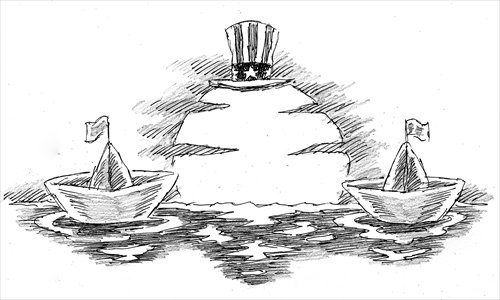New Delhi makes geopolitical calculation in playing South China Sea card

Illustration: Peter C.Espina/GT
"A nation has no permanent enemies and no permanent friends, only permanent interests." The quote from Winston Churchill, former British prime minister, seems appropriate when India's Oil and Natural Gas Corporation decided last week to restart the exploration activities for natural resources in the disputed waters of the South China Sea.
Natural resources are of great significance to India. In this regard, the competition between China and India might outweigh their bilateral cooperation. This competitive relationship could be seen in both countries' interests in terms of the quest for oil deals with the member states of Gulf Cooperation Council, Iran, Iraq, Central Asian countries, Russia, and even when it comes to the South China Sea. New Delhi is heavily reliant on foreign suppliers of energy resources.
New Delhi has its own geopolitical interests in mind too. By playing the card of the South China Sea issue, it wants Beijing to make compromises on the border disputes or Pakistan-related issues.
China has lodged official protests against such moves more than once, because this is not the first time India has explored for oil in the nine-dash line area claimed by China.
India is no longer "looking East," for it has already been "acting East." The current focus of the country's maritime strategy is the "Indo-Pacific." India not only intends to maintain its primary position in the Indian Ocean, but also aims at wielding more influences in the Pacific. That's why it is busy preparing for the upcoming Exercise Malabar, a joint naval drill involving the US, Japan and India, in the Indian Ocean in October.
India has long been treating the Indian Ocean as its own sphere of influence. Therefore, as China is enhancing its relationship with countries within the region, including Pakistan, Sri Lanka, Bangladesh and the Maldives, coupled with the recent news that Pakistan will buy eight submarines from China, New Delhi fears that the balance in the Indian Ocean will be disturbed. Indians are afraid that the water will be China's in the future.
American author Robert D. Kaplan wrote Monsoon: The Indian Ocean and the Future of American Power, in which he argues that the Indian Ocean is where the rivalry between the US and China in the Pacific interlocks with the regional rivalry between China and India.
To be frank, the US is driving a wedge between China and India. Indians should be aware that the biggest competitor against them in that area is Washington itself. The US has not only a naval base but also a fleet in the Indian Ocean.
The US is glad to see the disputes between China and India, as well as the rivalry between China and Japan, since it can therefore profit from others' conflicts. Besides, both Washington and Tokyo are cozying up to New Delhi, providing it with support of high-speed rail and official development assistance. India is hence balancing its ties with each side, in order to get advantages from all.
We should therefore not hype India's role in the South China Sea issue, but guide the nation to work with us.
Chinese Premier Li Keqiang has previously raised the appeal of connecting the "One Belt, One Road" initiative with the Bangladesh-China-India-Myanmar (BCIM) Economic Corridor. What we are now trying to do is to find out where and how we can cooperate with each other. China can provide technology and capital, while India and others have resources. In this way, there is no reason for those countries to turn down China's invitation for collaboration.
On the surface, India has not yet decided whether to join the "One Belt, One Road" initiative. Instead, it is promoting its own Spice Route, Cotton Route and Mausam projects. Yet all India has done is talk the project up, without any specific measures, unlike the "One Belt, One Road" initiative, for which China has already initiated the Asian Infrastructure Investment Bank (AIIB), the Silk Road Fund, and strategies to promote its high-speed rail networks abroad.
However, although New Delhi has not verbally confirmed its support to the "One Belt, One Road" initiative, it is upholding it by actions, for being one of the founding members of the AIIB and the BRICS New Development Bank. We should thus not magnify the competition between the two, but focus on developing common interests.
The author is director of the Institute for the Southern and Central Asian Studies at the Shanghai Municipal Center for International Studies. opinion@globaltimes.com.cn